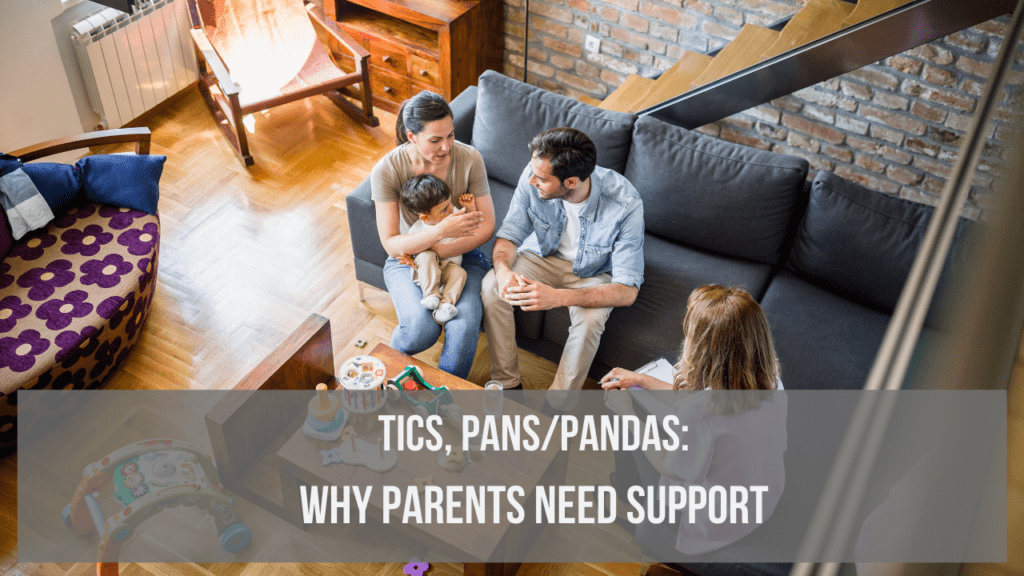When you are the parent of a child with tics, sometimes your nerves are just plain shot. Sometimes the noise, the movement, the repetition, the rituals, all just get to be too much. Sometimes people you love have different ideas of how your child’s tics should be approached or dealt with, and relationships you cherish start to feel lonely and out of alignment. Even if you have the best support network around you, you’re the one in the trenches with your child, and the only way out is through. Seeking out resources and information is crucial in understanding pediatric tics and how to best support your child. It’s important to remember that you are not alone in this journey, and there are professionals and support groups who can offer guidance and empathy. Taking the time to educate yourself about pediatric tics can help you feel more empowered and prepared to navigate the challenges that may arise. Understanding pediatric tics can also help you advocate for your child and ensure they receive the appropriate care and support they need. Parental support for tics is crucial in helping a child navigate their tic behaviors and develop coping strategies. It’s important to communicate openly with your child about their tics and reassure them that they are not alone in their experience. As a parent, seeking professional guidance and connecting with other families with pediatric tics experience can provide valuable insight and reassurance. Remember, it’s okay to ask for help and take care of yourself as you navigate this journey with your child.
You may have heard every piece of advice, read every article, listened to every podcast, tried every therapy, medication, or diet. Some of us wish we could have done all of these things and we just don’t have the time or energy, so we end up feeling guilty for not doing enough. Sometimes it feels like it’s all we can do to keep our heads above water.
It’s normal to need support going through this day in and day out. Mommin’ ain’t easy! At the beginning of our journey, I hoped to hear of someone somewhere who had a similar story and some advice on how the heck to navigate life with a kid who had tics. Social media wasn’t as prevalent as it is now and I was out of my element trying to figure out how to cope with it all and balance all of the other details of our household.
Over time, I made friends who had similar stories, advice to offer, and jokes to tell. To this day, we still talk about the challenges of being tic disorder kiddos’ mamas. I smile when we always circle back to the good stuff.
We talk about normal things. We talk about when our kids were little and how silly they were, when they started walking, talking, or what their first word was. We talk about mom things. About how dishes are piled at least sometimes at everyone’s house and how we all have a load of laundry left to do. We chuckle at how there are shoes at everyone else’s front doors and toys on everyone else’s floors, too. We all know what it feels like to step on a dang lego for the millionth time after the longest day ever. Everyone’s kid has forgotten their lunch, Science project, or gym uniform at some point. In those moments of connection, we feel a little less alone, and a little more sane.
Undeniably, we always end up sharing how strong our kids are. How much they have overcome. How they stood up for themselves or someone else because they know what it is like to be the one who is different. We talk about how they are articulate and reflective. We share how they are talented musically, athletically, artistically, etc. We talk about how they are creative and funny and kind to others. We talk about how perceptive our kids can be, how they often have a 6th sense about people, how they love animals, and how they are always down for a hug. We share our kids’ successes and our own successes, too.
Reading the good stuff, hearing the success stories, and even just knowing that day to day other people are going through or have gone through the same thing you are going through, helps. It’s important to be part of a whole, included in a group, and to feel like you are not alone. We need a safe place to hear what other parents have tried, ask our questions, and get great feedback from experts.
The Tic Disorder Parent Support Group is a platform for parents to connect with one another, offer support, ask questions, share success stories, tough problems, and more. It’s also a place to connect with parents of kids I have worked with. I post links to my blogs and podcasts, I address common questions, and I offer a FREE Live Tic Talk Tuesday every week where you can hear me speak about tic disorder FAQs and ask me questions live. Additionally, the support group is an excellent resource for parents interested in learning more about mapping out tics and PANS/PANDAS. Members can access resources and information on these topics and connect with other parents who have experience dealing with these issues. The group provides a supportive and understanding community for parents navigating the challenges of tic disorders and related conditions.
It is easy to get caught up in difficult moments. You may be the parent of a recently diagnosed kiddo, a concerned grandparent, Aunt or Uncle, or maybe you’ve been walking this road for a long time and your child is really struggling. I invite you to My Tic Disorder Parent Support Group!
If you are interested in scheduling a Initial Consultation Call, I would love to hear your story and share how I can help!

